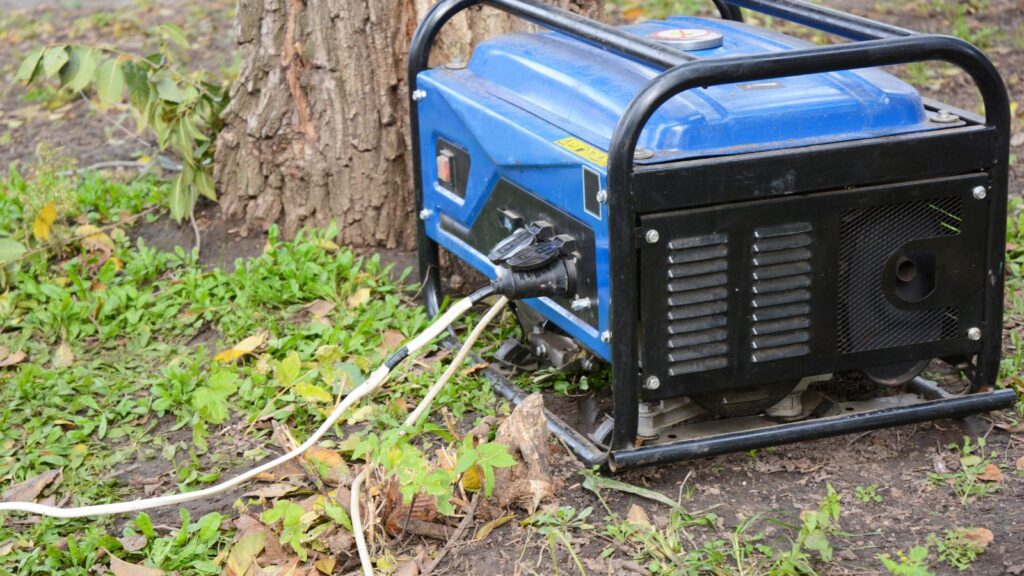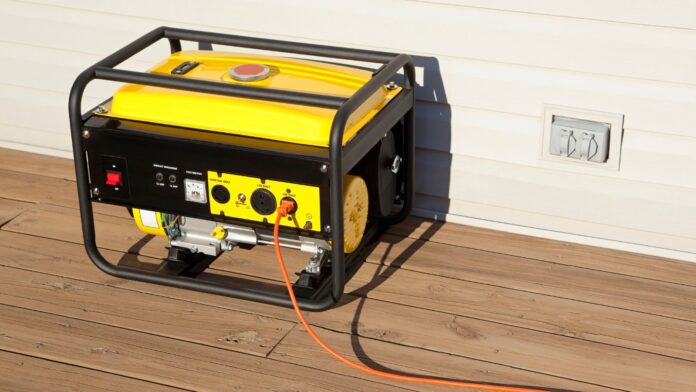Power outages and off-grid living can be challenging, but with the right portable generator, you’ll have a reliable solution at hand to keep your devices running smoothly.
In “The Ultimate Guide to Choosing the Best Portable Generator for Your Needs,” we will help you navigate through the different types of generators available and discuss essential factors that ensure you make an informed decision.
We’ve got everything from wattage requirements to fuel options covered – all compiled into this comprehensive guide built for anyone looking to secure their backup power source.
Key Takeaways
- To choose the right portable generator, it’s essential to consider your power needs and wattage requirements for appliances and devices. This will help you identify the appropriate generator size and capacity.
- Fuel type options such as gasoline, propane, or diesel are crucial factors to consider when selecting a portable generator. It’s important to also consider fuel availability in your location for cost-effectiveness in the long term.
- Noise level considerations, portability, weight, runtime requirements, and price point should also be considered when choosing a suitable portable generator that fits both emergency backup needs or off-grid living situations.
- Top picks on the market include reliable and efficient models such as Honda EU2200i and Ryobi RYi2322VNM generators which are great for small spaces while producing adequate power output up to 2,200 watts.
Understanding Portable Generators
Portable generators work by using an internal combustion engine to convert fuel into electrical power, which is then delivered to appliances and devices through outlets.
How They Work
Portable generators are designed to provide temporary electrical power, making them perfect for off-grid living enthusiasts and anyone in need of a backup power source. They work by converting mechanical energy into electrical energy through an internal combustion engine.
For example, during a camping trip with no access to the grid, you could use a portable generator to charge smartphones or keep essential devices running. Similarly, if your area experiences frequent power outages due to storms or other emergencies, having a portable generator on hand ensures that you won’t be left in the dark.
Types Of Portable Generators
There are four main types of portable generators: solar, recreational, emergency, and professional. Solar generators use renewable energy to power your devices and appliances.
They’re great for camping trips or in areas where access to electricity is limited.
Emergency generators provide reliable backup power during unexpected power outages caused by natural disasters or other disruptions. These portable generators often run on gasoline or propane and can be used to power essential appliances like refrigerators, lights, and medical equipment.
Finally, professional-grade portable generators are ideal for heavy-duty applications such as construction sites or powering large events.
Advantages Of Using Portable Generators
Portable generators offer a range of benefits for those interested in off-grid living. One significant advantage is the ability to have backup power during emergencies or power outages, ensuring you never go without electricity when you need it most.
These portable units are also very versatile and can be used for outdoor events or camping trips where access to electrical outlets might not be available. Additionally, some portable generators come with quiet operation technology, making them an ideal option for using in residential areas without disturbing neighbors.
Factors To Consider When Choosing A Portable Generator
When choosing a portable generator, it is important to consider factors such as your power needs, wattage requirements for appliances and devices, fuel type options and availability, noise level considerations, portability and weight, runtime requirements, and price point considerations.
Identifying Your Power Needs
To choose the right portable generator, it’s important to identify your power needs. Start by making a list of all the appliances and devices you’ll need to power in case of an outage or off grid living.
Consider their wattage requirements and how long you plan on running them. For example, a fridge may require around 600-700 watts while running but may only run for six hours per day.
Once you have identified your power needs, use them as a guide to selecting the appropriate generator size and capacity. Don’t forget to account for any additional devices or equipment that may be necessary such as fans, heaters, lights, or power tools.
Wattage Requirements For Your Appliances And Devices
It’s important to consider the wattage requirements of your appliances and devices when choosing a portable generator. This information can be found on the labels or in the manuals of each item, and will help you determine how much power you need to generate.
For example, a refrigerator typically requires around 600 watts, while a window air conditioner may require up to 1,500 watts.
Knowing your wattage requirements is essential for selecting a generator with enough capacity to support all your necessary appliances and devices. A Portable Generator Wattage Estimate Worksheet can help estimate the necessary power for every appliance in your home.
Fuel Type Options And Availability
The type of fuel a portable generator uses is an important factor to consider when selecting one for off-grid living. There are typically three options available: gasoline, propane, and diesel.

Gasoline generators are popular due to their availability and affordability while propane-powered generators offer cleaner emissions and longer shelf life for the fuel. Diesel generators run efficiently but are generally more expensive than gasoline generators.
It’s important to also consider the availability of each type of fuel in your area as this can affect convenience and cost-effectiveness in the long term.
Noise Level Considerations
One crucial factor to consider when selecting a portable generator is the noise level. Generators can be noisy and disturb both you and your neighbors, which could result in complaints or even legal action.
For instance, inverter generators are known for their quiet operation thanks to their advanced technology that allows them to adjust power output according to demand. Additionally, dual fuel generators may produce more noise than gasoline-only models because of additional fans needed for cooling.
Portability And Weight
Portability and weight are crucial factors to consider when selecting a portable generator, especially for those interested in off-grid living. You’ll need to move your portable power source from one location to another as needed, so it is essential that you select a model that is easy to transport.
Lighter models with wheels or handles can be easily moved around the yard or campsite as needed without putting a strain on your back. However, keep in mind that lighter models may not offer enough power output for all of your needs.
Consider balancing portability with size and wattage requirements so you can enjoy uninterrupted power wherever you go.
Runtime Requirements
One important factor to consider when choosing a portable generator is the runtime requirements. This refers to how long the generator can run continuously before needing to be refueled or recharged.
Different generators have different fuel capacities and efficiency ratings, which will affect their runtime.
For example, a smaller generator with a lower wattage output may be able to run for several hours on one tank of gas, while a larger generator may only run for an hour or two before needing more fuel.
Additionally, being aware of the amount of fuel you need and planning accordingly can help extend your runtime.
Overall, considering runtime requirements is crucial when selecting a suitable portable generator for your needs.
Price Point Considerations
Price is a crucial factor to consider when choosing the best portable generator for your needs. It’s important to determine your budget before beginning your search for a generator.
Keep in mind that generators can vary greatly in price depending on their features and functions.
Additionally, consider the long-term costs of owning a portable generator, including maintenance and fuel expenses.
It’s important not to compromise quality over price when selecting your portable generator, but finding the right balance between affordability and functionality will ensure you get the most value out of your investment.
Top Portable Generators On The Market
The Honda EU2200i, Ryobi RYi2322VNM, DeWalt DXGNI2200 and Generac Portable Generators are some of the best options on the market for portable generators.
Honda EU2200i
The Honda EU2200i is a reliable and efficient portable generator that’s great for off-grid living. With its compact design, it won’t take up too much space in your RV or cabin.
It produces 2,200 watts of power which can easily run most of your essential appliances during an emergency power outage or while camping. The advanced inverter technology offers clean and stable power output, making it safe to use with sensitive electronics such as laptops and smartphones.
Another excellent feature of the Honda EU2200i is its quiet operation level at only 48-57 decibels, about as loud as a normal conversation. This makes it perfect for use while camping or in residential areas where noise levels are closely monitored.
Ryobi RYi2322VNM
The Ryobi RYi2322VNM is a reliable portable generator that provides up to 2,300 running watts of power and has a peak wattage capacity of 2,800. This inverter generator is perfect for off-grid living as it can be used to power appliances, tools, and electronics while being outdoors or during a power outage.
The Ryobi RYi2322VNM runs quietly at just over 57 decibels which makes it an ideal choice for campers who wish to enjoy the peace and serene environment of nature without disturbing their fellow campers.
It also features an automatic idle technology that adjusts the engine’s speed according to the load requirements which increases its fuel efficiency by consuming less gasoline.
DeWalt DXGNI2200
The DeWalt DXGNI2200 is a reliable and efficient portable generator that’s perfect for people who need power on-the-go. This generator runs quietly and offers up to 2,200 watts of power, making it ideal for powering small appliances or electronic devices during outdoor activities like camping or tailgating.
Its compact size makes it easy to transport, while its sturdy build ensures it can withstand rough handling during transportation. Additionally, the DeWalt DXGNI2200 features multiple outlets for various types of plugs and connectors and comes with a three-year warranty for added peace of mind.
Generac Portable Generators
Generac is a well-known brand in the portable generator world, providing reliable backup power solutions for homes and businesses. Their generators are available in various sizes and wattages, making them suitable for different needs.
One of Generac’s most popular models is the GP6500 Portable Generator, which delivers 8,000 watts of starting power and 6,500 watts of running power. It comes equipped with a powerful OHV engine that ensures efficient fuel consumption while delivering consistent performance.
Additionally, it has a large-capacity steel fuel tank that enables extended runtime on a single tank of gasoline.
Generac offers versatile options such as dual-fuel generators capable of using propane or natural gas and even Wi-Fi-enabled models for remote monitoring.
Harbor Freight Generators
Harbor Freight generators are another option to consider when selecting a portable generator for your off-grid living needs. Known for their affordability, Harbor Freight offers models ranging from 900 watts to 13,000 watts with prices starting at around $100.
However, with lower price points come potential trade-offs in features and quality. It is important to carefully consider your power needs and research the specific model you are interested in before making a purchase.
Keep in mind that customer support and warranty options may also vary compared to other more expensive brands on the market.
Comparison Of Features And Benefits
When selecting a portable generator, it’s crucial to consider the various features and benefits offered by each model. The Honda EU2200i boasts an impressively quiet operation of only 48 decibels and offers up to 8.1 hours of continuous power on just one gallon of fuel.
The Ryobi RYi2322VNM also offers quiet operation at only 57 decibels, with a runtime of up to 10 hours per tank. For those looking for a dual-fuel option, the DeWalt DXGNI2200 can run on either gasoline or propane and includes an automatic voltage regulator for stable and reliable power output.
Harbor Freight generators offer budget-friendly options while still providing ample power output suitable for most off-grid living needs. When comparing these models side-by-side, it’s essential to assess which features meet your specific requirements as well as overall reliability based on user reviews and expert opinions.
Maintenance, Safety And Efficient Operation Tips
It’s important to know how to safely and efficiently operate your portable generator. This section will cover basic maintenance requirements, safe operation guidelines, carbon monoxide poisoning prevention strategies, proper generator placement considerations, fuel handling best practices, and efficient ways to use your generator.
Basic Maintenance Requirements
To ensure the longevity and optimal performance of your portable generator, it’s essential to prioritize basic maintenance practices. One crucial aspect is keeping the generator clean and free from debris or dust accumulation.
Additionally, regular oil changes are necessary to prevent engine damage and keep the generator running smoothly. It’s also important to check the air filter periodically and replace it as needed.
Another key maintenance practice is properly storing your portable generator when not in use for extended periods. This includes draining fuel tanks and carburetors, removing batteries, and protecting against moisture buildup.
Carbon Monoxide Poisoning Prevention Strategies
Carbon monoxide poisoning is a serious concern when using portable generators. This odorless gas can be deadly if not detected early. The best prevention strategy is to keep the generator outside and away from any vents or windows that could cause exhaust to enter your living space.
Additionally, it’s important to install CO detectors in every sleeping area of your home or RV.
Regular maintenance of your generator can also reduce the risk of carbon monoxide exposure by ensuring proper ventilation and exhaust function. It’s important to review safety procedures with everyone in your household and educate yourself on the symptoms of carbon monoxide poisoning such as headache, dizziness, nausea, and confusion.
Proper Generator Placement Considerations
It is crucial to choose the right spot for your portable generator so that it operates safely and efficiently. You should place your generator in a well-ventilated area with adequate space around it, at least five feet away from any doors or windows, and at a distance where exhaust fumes will not enter your living space.
Make sure to keep the generator dry and protected from rain, snow, or other weather elements. If you plan on using the generator indoors, ensure proper ventilation by opening doors and windows or using an exhaust pipe to direct fumes outside.
Also, secure your generator against theft by locking it up when not in use.
Fuel Handling Best Practices
Proper fuel handling is crucial when operating a portable generator. It’s essential to store your fuel in an approved container and away from ignition sources such as flames, sparks, and electrical equipment.
Gasoline can be volatile, so it’s imperative not to overfill the tank or spill any onto the ground. Always use fresh gasoline and add stabilizer to help extend its shelf life.
In emergencies or in cases where you’re experiencing power outages for extended periods, it may be necessary to stockpile additional fuel supplies outside of your home or living area.
Be sure to store these fuels safely by selecting a location that is well-ventilated and secure from curious children or pets who might cause unintentional harm.
Efficient Ways To Use Your Generator
One of the most important steps in using your portable generator efficiently is to ensure that it’s properly sized for your power needs. This means estimating how much power you need and selecting a generator that can meet those requirements without being oversized.
Another key factor is learning how to start and stop the generator safely, as well as how to store fuel safely. In addition, proper maintenance of your generator will help ensure its longevity and reliability.
To maximize efficiency while using your portable generator, it’s important to avoid overloading it by connecting too many devices at once or running larger appliances like air conditioners or electric heaters continuously.
Instead, try staggering their use throughout the day so that each device receives adequate usage time while minimizing overall demand on the system.
Conclusion
In conclusion, choosing the best portable generator for your needs can seem overwhelming at first. However, with the right information and considerations, you can find a reliable and efficient generator that suits your power requirements.
Remember to identify your wattage needs, consider fuel type options, prioritize noise levels and portability, and practice safe operation and maintenance. By using this guide as a reference point alongside consumer reports and expert recommendations on specific models such as the Honda EU2200i or Ryobi RYi2322VNM, you can feel confident in making an informed decision.
FAQs:
1. What factors should I consider when choosing a portable generator for my needs?
When choosing a portable generator, you should consider the wattage needed to power your equipment or appliances, the fuel type and capacity, noise level, weight and portability, runtime on a full tank of gas, and any additional features such as an electric start or parallel capability.
2. Can I use a portable generator indoors?
Portable generators are not meant to be used indoors due to the risk of carbon monoxide poisoning. You should always operate them in well-ventilated areas outside of living spaces.
3. How do I maintain my portable generator?
Regular maintenance is important to ensure your generator operates safely and efficiently. This includes checking oil levels before each use, changing the oil every 50-100 hours of operation, cleaning or replacing air filters regularly, inspecting spark plugs for wear or damage annually or after every 100 hours of operation.
4. Can I connect my portable generator directly to my home’s electrical system?
Connecting a portable generator directly to your home’s wiring can be dangerous and may result in serious injuries or even death from electrocution for utility workers servicing nearby lines during an outage.Therefore it’s recommended that homeowners install transfer switches which allow select circuits within houses/businesses remain powered via generators while preventing direct connection between main electricity supply & emergency power source (generator).




